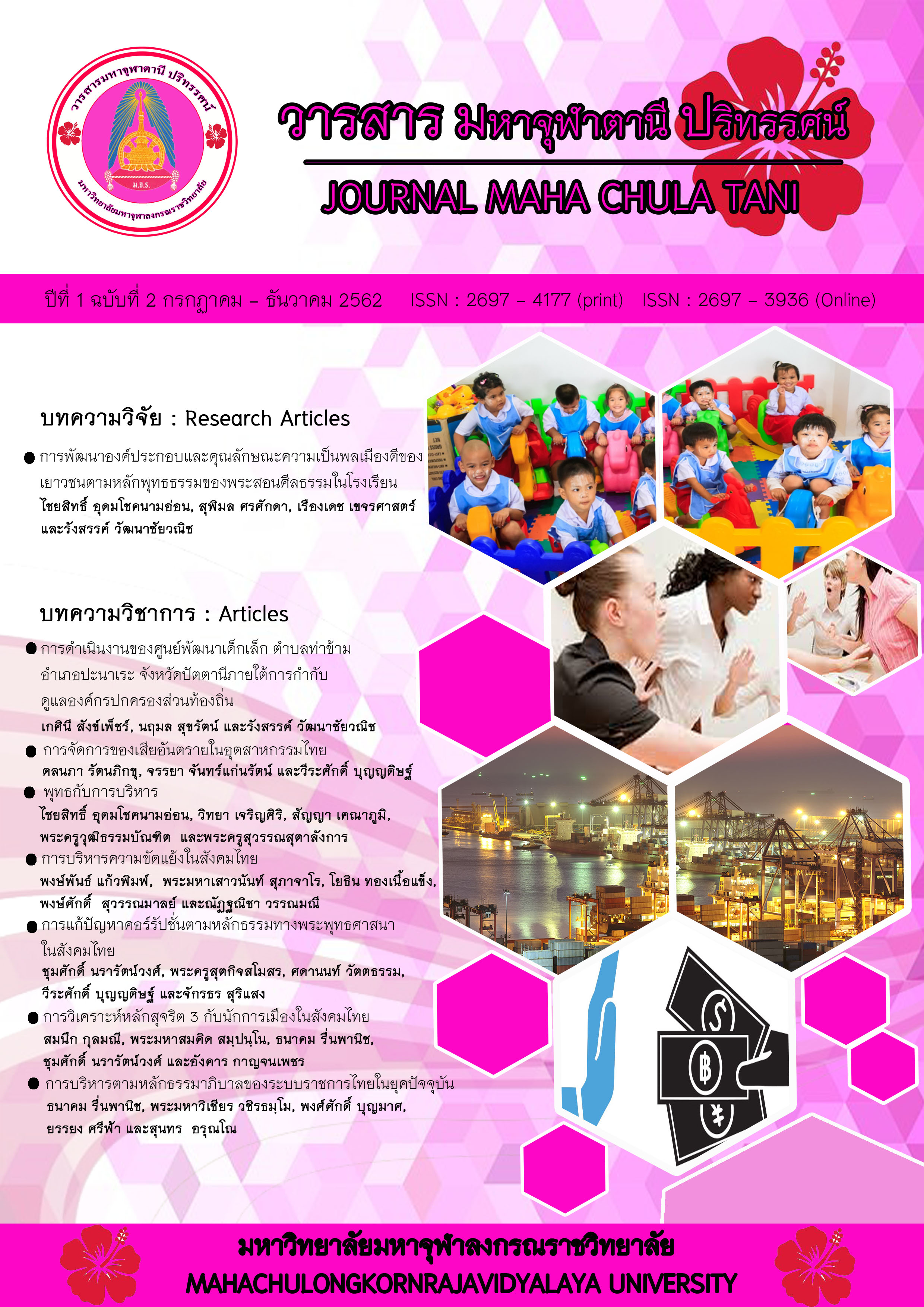การพัฒนาองค์ประกอบและคุณลักษณะความเป็นพลเมืองดีของเยาวชน ตามหลักพุทธธรรมของพระสอนศีลธรรมในโรงเรียน
Main Article Content
บทคัดย่อ
การวิจัยครั้งนี้ เป็นการศึกษายุทธศาสตร์การพัฒนาเครือข่ายทางการศึกษาของโรงเรียนพระปริยัติธรรมแผนกสามัญ ในจังหวัดอุบลราชธานี เป็นการศึกษาวิจัยแบบผสมผสาน (Mix Methodology Research) โดยใช้วิธีเก็บรวบรวมข้อมูล 2 รูปแบบคือ รูปแบบวิจัยเชิงปริมาณ โดยใช้แบบสอบถาม (Questionnaire) โดยมีกลุ่มตัวอย่าง จำนวน 250 คน โดยหาค่าความเชื่อมั่นของเครื่องมือตามวิธีการของครอนบาค ในการวิเคราะห์ข้อมูลใช้โปรแกรมคอมพิวเตอร์สำเร็จรูปวิเคราะห์หา ค่าร้อยละ ค่าเฉลี่ย ส่วนเบี่ยงเบนมาตรฐาน และรูปแบบการวิจัยเชิงคุณภาพเป็นแบบแนวสัมภาษณ์ คำถามปลายเปิด (Open-ended questions) สัมภาษณ์ผู้บริหาร ครูผู้สอน อาจารย์และพระนิสิต จำนวน 34 รูป/คน
ผลการวิจัย พบว่า 1) การศึกษาการพัฒนาองค์ประกอบและคุณลักษณะความเป็นพลเมืองดีของเยาวชนตามหลักพุทธธรรมของพระสอนศีลธรรมในโรงเรียน โดยรวมทุกด้าน อยู่ในระดับมาก (=3.97) คือ ด้านคุณลักษณะของความเป็นพลเมืองดีอยู่ในระดับมาก (=3.98) ด้านคุณสมบัติของพระสอนศีลธรรม อยู่ในระดับมาก (=3.91) ด้านกระบวนการเสริมสร้างจิตสำนึกความเป็นพลเมืองดี อยู่ในระดับมาก (=3.90) 2) การวิเคราะห์การพัฒนาองค์ประกอบและคุณลักษณะความเป็นพลเมืองดีของเยาวชนตามหลักพุทธธรรมของพระสอนศีลธรรมในโรงเรียน 2.1) ครูผู้สอนต้องมีทั้งความรู้ ควบคู่กับคุณธรรม มีหลักธรรมประจำใจ เป็นแบบอย่างที่ดีให้แก่ศิษย์ 2.2) ครูผู้สอนเป็นคนเก่ง มีจิตสาธารณะ เป็นคนดี มีคุณธรรม มีหลักธรรมประจำใจ มีความอ่อนน้อมถ่อมตน มีความกตัญญูกตเวที มีศีลธรรม เป็นผู้เสียสละ มองเห็นประโยชน์ส่วนรวมเป็นที่ตั้ง 2.3) ครูผู้สอนมีการดำเนินการภายใต้พระราชบัญญัติการศึกษาแห่งชาติ และยุทธศาสตร์การศึกษาของชาติ สามารถสร้างสรรค์ชีวิตอยู่ในสังคมได้อย่างเป็นสุข 2.4) ครูผู้สอนมีกระบวนการพัฒนาความเป็นพลเมืองดี โดยผ่านการจัดกิจกรรมการเรียนรู้ตามแนวพระพุทธศาสนาในการจัดการเรียนรู้และการพัฒนา เช่น หลักศีล 5 หลักสังคหวัตถุ 4 หลักพรหมวิหาร 4 หลักค่านิยมพื้นฐาน 4 ประการ เป็นต้น
Article Details

อนุญาตภายใต้เงื่อนไข Creative Commons Attribution-NonCommercial-NoDerivatives 4.0 International License.


